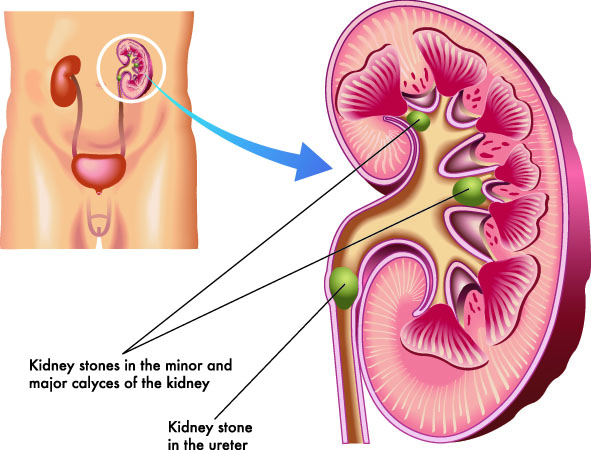Contrasting Kidney Stones vs UTI: What You Required to Find Out About Their Impact on Health
Contrasting Kidney Stones vs UTI: What You Required to Find Out About Their Impact on Health
Blog Article
Checking Out the Manifestations and Causes of Kidney Stones in Contrast to Urinary Tract Infections: A Detailed Guide
The exploration of kidney rocks and urinary tract infections (UTIs) reveals a complicated interplay of symptoms and underlying causes that necessitate mindful examination. What are the key differences in their symptoms, and how might these inform treatment methods?
Review of Kidney Stones
Kidney rocks, additionally known as kidney calculi, type when certain substances in the pee crystallize and accumulation, bring about the growth of difficult deposits within the kidneys. These rocks can differ in dimension, ranging from a grain of sand to a golf round, and can be composed of various products, one of the most common being calcium oxalate, uric acid, struvite, and cystine. The formation of kidney stones is influenced by several aspects, consisting of dietary practices, fluid intake, and genetic predisposition.
Signs of kidney stones might include severe pain in the back or side, blood in the pee, queasiness, and constant urination, particularly as the rock moves through the urinary system. Diagnosis typically entails imaging researches such as ultrasound or CT scans, alongside urinalysis to identify the rock's composition.
Treatment alternatives differ based on the dimension and kind of rock, along with the seriousness of symptoms (Kidney Stones vs UTI). Little rocks might pass naturally with increased liquid consumption, while larger rocks might need medical treatments such as lithotripsy or surgical removal. Recognizing the pathophysiology and risk aspects connected with kidney stones is essential for reliable prevention and management
Review of Urinary System Tract Infections
Urinary system infections (UTIs) are typical bacterial infections that impact any type of part of the urinary system, including the kidneys, ureters, bladder, and urethra. They primarily occur when germs, often from the gastrointestinal system, go into the urinary system, causing swelling and infection. UTIs are classified right into 2 major kinds: straightforward and difficult. Straightforward UTIs generally happen in healthy individuals with regular urinary systems, while challenging UTIs might occur in people with underlying conditions, such as structural abnormalities or jeopardized immune systems.
The prevalence of UTIs is significantly greater in females than men, largely due to anatomical distinctions, such as a shorter urethra. Danger variables include sex, particular contraceptive methods, urinary system retention, and dehydration. The medical diagnosis of UTIs is generally confirmed with pee tests, which might expose the existence of bacteria, leukocyte, or red cell.

Signs of Kidney Stones
The discomfort associated with kidney rocks can materialize in different methods, usually leading people to seek clinical interest. One of the most usual signs and symptoms is serious pain, commonly localized in the reduced back or side, which might radiate to the abdominal area or groin. This pain, frequently defined as sharp or cramping, can happen unexpectedly and might rise and fall in intensity.
Furthermore, people may experience hematuria, or blood in the urine, which can vary from tiny amounts to visible discoloration. This signs and symptom may be gone along with by adjustments in urinary routines, such as raised regularity or urgency, as well as discomfort throughout peeing. Queasiness and vomiting are also widespread, typically resulting from the body's response to extreme discomfort.
In some situations, people may experience high temperature and cools, specifically if a secondary infection develops due to the blockage triggered by the rocks. In general, the mix of navigate to these guys severe discomfort, hematuria, modified urinary patterns, and intestinal symptoms can provide substantial understanding into the presence of kidney rocks, calling for timely medical analysis and treatment. Understanding these signs and symptoms is critical for timely diagnosis and reliable administration of the problem.
Signs of Urinary System Tract Infections
Infections within the urinary system tract usually provide a variety of unique signs and symptoms that can substantially impact every day life. One of the most common signs include a consistent impulse to pee, often gone along with by a burning feeling during peeing, known as dysuria. People might likewise experience raised frequency of peeing, producing percentages of urine each time.
Other remarkable signs include gloomy or smelly pee, which might suggest the existence of germs or pus. Sometimes, pee might show up red or pink because of the presence of blood, a problem referred to as hematuria. Furthermore, people might experience pelvic pain or pressure, which can further aggravate the feeling of seriousness.
Systemic symptoms might also materialize, such as high temperature, chills, and exhaustion, especially if the infection has actually risen to the kidneys. It is vital to recognize these signs early, as unattended urinary system system infections can cause much more severe difficulties. Kidney Stones vs UTI. Trigger medical interest is recommended when these signs and symptoms are dig this observed, permitting appropriate analysis assessment and therapy to minimize discomfort and stop further health and wellness concerns
Reasons For Each Problem
Frequently, kidney rocks and urinary system tract infections occur from distinctive yet sometimes overlapping causes that can influence people differently. Kidney stones typically develop as a result of metabolic aspects, nutritional choices, and genetic proneness. Enhanced degrees of calcium, oxalate, or uric acid in the pee can bring about rock formation. Dehydration, inadequate fluid intake, and high-sodium diet plans can aggravate these conditions, promoting condensation within the urinary system.

Recognizing these unique reasons is vital for avoidance and treatment. Kidney Stones vs UTI. While lifestyle modifications might alleviate the danger of kidney rocks, proper health and prompt therapy of urinary system system infections are crucial for reducing their reappearance and linked problems
Final Thought
In summary, kidney rocks and urinary system infections existing distinct signs and underlying reasons. Kidney rocks are defined by severe discomfort and metabolic factors, while urinary system tract infections primarily include bacterial infections causing urinary system seriousness and discomfort. Although both conditions can result in hematuria, their formation systems vary significantly. Understanding these differences is essential for efficient medical diagnosis and treatment, ultimately boosting individual results for those influenced by either condition.
The expedition of kidney rocks and urinary system system infections (UTIs) discloses an intricate interaction of signs and underlying reasons that warrant careful assessment.Urinary system system infections (UTIs) are typical microbial infections that influence any part of the urinary system, consisting of the kidneys, ureters, bladder, and urethra.Often, kidney rocks and urinary system tract infections emerge from unique yet occasionally overlapping causes that can impact people differently.In summary, kidney stones and urinary system system infections existing company website distinct signs and underlying reasons. Kidney stones are defined by serious pain and metabolic variables, while urinary tract infections largely involve microbial infections leading to urinary seriousness and pain.
Report this page